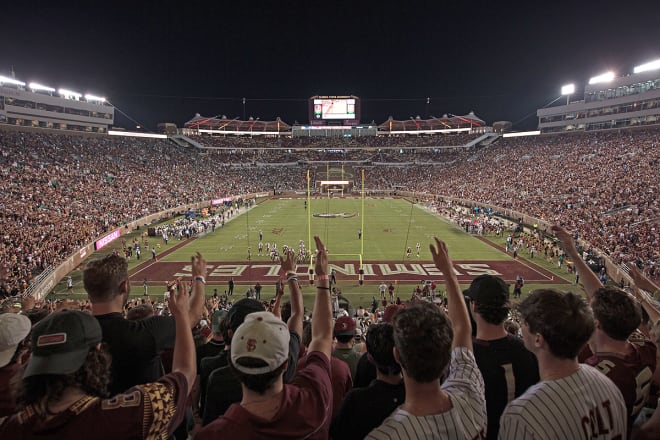Schoffel: Top takeaways from ACC Spring Meetings, and a hope for the future
AMELIA ISLAND, Fla. -- If anyone came to this week's Atlantic Coast Conference spring meetings seeking greater clarity about the future of college athletics and additional confidence in the ACC's ability to keep up financially with other leagues, they likely left wanting more.
Much more.
From the "Wild, Wild West" that is the NIL landscape to concerns about tampering and the transfer portal to doubts about the long-term viability of the ACC, there were far more questions than answers this week at the Ritz-Carlton Amelia Island.
*** Don't miss out on any of our great FSU Sports coverage. Get your 30-day FREE trial ***

Then as second-year ACC Commissioner Jim Phillips spoke with the media late Wednesday afternoon to recap the week's events, he dropped this little nugget of uncertainty on reporters:
"I think it's time for us to look at alternative models for football," he said. "If we're ever going to do something -- and I hear about the future of football and taking care of the sport of football -- this is the time to do it. This is the time to do it, when you're reorganizing a structure like the NCAA.
"What are you doing with the sport of football? Does it need to be managed separately? Do you need to have a governance structure? Those are questions we should be asking ourselves."
Well, OK then.
So what exactly does that mean?
Well, Phillips is now the second high-level college sports official floating that concept publicly in the last few days. Ohio State athletics director Gene Smith made a similar comment last week, suggesting that perhaps the College Football Playoff should have oversight of football while the NCAA keeps an eye on everything else.
Not all of college football, of course. Just the 10 FBS conferences and Notre Dame. With the idea being that the bigger football programs could operate independently of the NCAA -- or "parallel" to it, as Phillips said -- and not be subject to the same rules and regulations.
Until very recently, many college sports observers thought it was more likely that the Power 5 conferences would break off from the NCAA and start their own governing body. But Phillips explained to the ACC's athletics directors and coaches this week -- and then reiterated it to the media Wednesday -- that he doesn't see that happening any time soon.
One huge problem with that concept is risking the golden goose that is the NCAA men's basketball tournament, which is under contract with CBS and Turner through 2032. According to reports, that deal will deliver $1.1 billion per year beginning in 2025.
"No one wants to disrupt that," Phillips said. "Basketball feeds a lot of mouths in college athletics, and a lot of schools depend on that. It's one of the great tournaments that we have in college athletics. ...
"I hear a lot about Power 5 moving away from everyone else ... I don't see that happening right now, or over the next five or 10 years. I just don't."
That doesn't mean there won't still be seismic change.
Phillips, who is on the NCAA's 21-member Division I Transformation Committee, acknowledged that he doesn't know exactly what conclusions that group is going to come up with, but he does believe there will be a major downsizing of the NCAA.
He said there's a feeling that college athletics' longtime governing body is "bloated" and not capable of reacting swiftly to urgent matters.
"I think it's going to be a trimmed-down NCAA," Phillips said. "I think more authority and more administrative work and responsibility is going to fall on the conferences. And then more is going to fall on the institutional level."
From speaking with several ADs and coaches at the ACC meetings, a key focus there appears to be the enforcement piece. So when it comes to investigating recruiting violations or other improprieties, those could be handled at the conference level instead of by the NCAA. Phillips said another option is having a "third party" handle enforcement.
That's only the beginning.
According to multiple previous reports, the Transformation Committee is considering other groundbreaking changes as well, including removing the limits on sizes of football coaching staffs and allowing sports like baseball and softball to provide full scholarships for every player. It would then be up to each individual conference to enact any limitations.
Phillips said Wednesday there's also the possibility of new subdivisions being created within Division I so that schools of similar resources could compete with each other -- beyond the current FBS/FCS model in football.
The Transformation Committee was supposed to have its work completed by Aug. 1, but there are questions about whether that deadline can be met. Whenever it comes to fruition, one thing seems abundantly clear -- college athletics is going to look entirely different in the future than it has in the past.
On that matter of enforcement ...
I'll have another article coming soon on how ACC coaches are handling NIL-related recruiting issues and widespread concerns about tampering, but it was clear this week that most were skeptical the NCAA will really be able to crack down the way they suggested in a Monday news release.
When we spoke with Phillips on Wednesday, he said he believes the NCAA does mean business. But if that's the case, they'll need to flex some muscle very soon.
Several coaches we spoke with said everyone will be watching over the next month or two to see if any schools get hit with full-fledged investigations. If that doesn't happen, people will take that as a green light, and illicit activity will only increase.
No good answers on revenue gap, but hope for future?
We asked several athletics directors this week to discuss their feelings about the ACC's future given the ever-widening revenue gap with the SEC and Big Ten, and most of the answers were some variation of, "We can only control what we can control."
In other words, it is what it is.
While that won't bring any comfort to fans of FSU and other schools who are getting panicky about a future where their rivals in the SEC are bringing in tens of millions of additional TV dollars each year, I'm not really sure what the ACC can do about it.
They're working on reshaping the future football schedules, with a hope that ESPN will see fit to give them more money and better time slots. Phillips mentioned several other revenue-generating ideas as well. But none of them are likely to put a dent in the massive disparity between what ACC schools receive each year and the payouts in what some are now describing as the Power 2.
"We're getting to a two solar system model here," Notre Dame athletics director Jack Swarbrick said on Thursday, according to ESPN's David Hale. "You have two suns with all the gravitational pull -- the Big Ten and the SEC. People are going to have to figure out how to align with one or the other.”
The fact that Swarbrick, whose Fighting Irish are a partial member of the ACC, feels comfortable making that comment -- while attending the ACC meetings, no less -- tells you all you need to know about the long-term future of this conference.
If I had to guess -- and this is only a guess -- this is very much tied to what Phillips was talking about with "alternate models" for football.
In the short term, Division-I football gets its own governing body, and that organization oversees all 10 FBS conferences and Notre Dame. Meanwhile, the rest of college athletics continues to operate under the "trimmed-down" NCAA.
Then at some point, when the lawyers and accountants can make it work -- and long-term contracts can be reworked or settled -- there eventually will be a move to the "super-conference" model we have all been thinking and talking about for quite some time now.
But only in football.
And whether it's the best 32 or 48 or 64 programs in the country, those will be the ones operating under the umbrella of a separate, elite college football league. The other schools, who don't want to invest the same amount of resources and don't offer the same cachet, will play in a lower division.
And based on what Swarbrick said about schools aligning with the "two suns," I would think some version of an expanded SEC will be on one side and an expanded version of the Big Ten will be on the other.
Is that just wishful thinking from someone with a vested interest in a school in the ACC? Perhaps.
But based on everything we know about the long-term financial picture of this conference, it sure beats thinking about the alternative.
Contact managing editor Ira Schoffel at ira@warchant.com and follow @IraSchoffel on Twitter.
----------------------------------------------------
Talk about this story with other Florida State football fans in the Tribal Council
